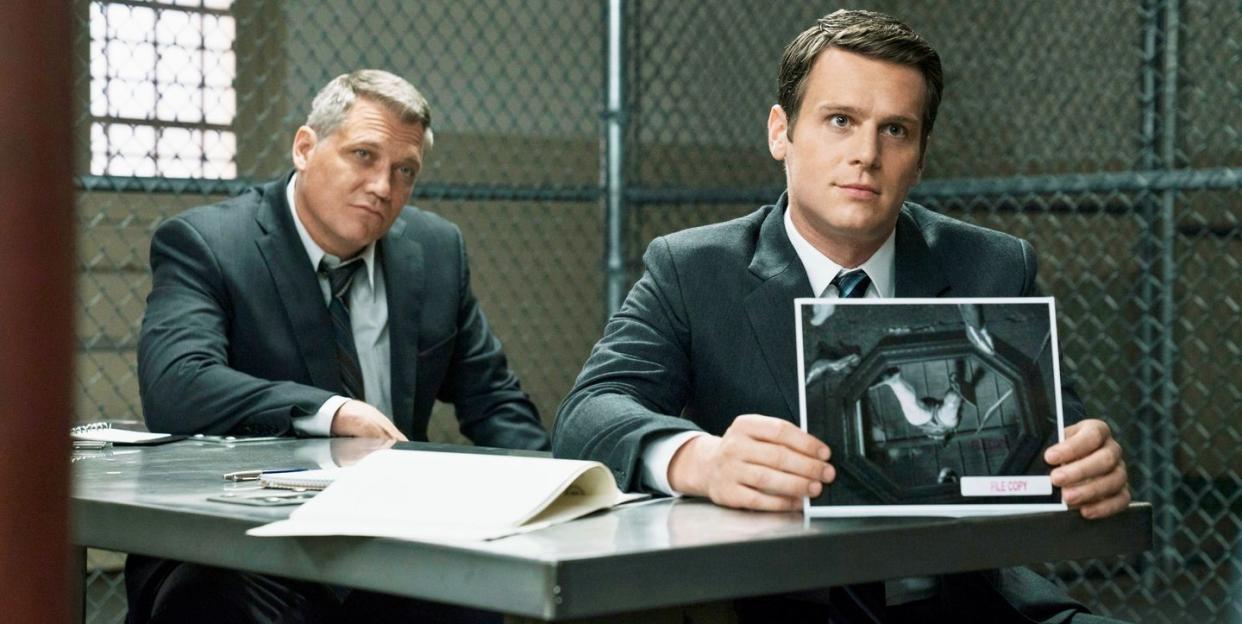The True Story Behind 'Mindhunter' Is Legit Nuts

All over the world, Mindhunter fans are counting down the days until the hit TV show returns to Netflix for its highly-anticipated (and tbh, long overdue) second season this August.
If you loved season one, then you probably can't wait to see what crimes FBI agents Holden Ford (Jonathon Groff) and Bill Tench (Holt McCallany), with the help of psychologist Wendy Carr (Anna Torv), try to solve using insight gained from interviewing imprisoned serial killers in season two.
But before you resort to binge-watching old episodes in preparation for the show's return (hey, gotta deal with that withdrawal somehow), let's set the record straight: Is Mindhunter based on a true story?
**Kool-Aid Man voice**: Ohhhhh yeah.
Netflix got the inspiration for its series from the true crime book of the same name by real-life FBI agent John E. Douglas and Mark Olshaker.
During Douglas' 25 years working in the FBI Investigative Support Unit, he used psychological profiling to get inside the heads of the United States' most infamous serial killers and criminals.
Douglas was a big deal in law enforcement, interviewing a veritable who's who of the extremely wicked, shockingly evil and vile, from Ted Bundy to Ed Gein to Charles Manson.
But the interview process you see on screen is different from how it was IRL.
In a recent interview with Digital Spy, the FBI Special Agent revealed his preparation process for those interviews: "I study the crime backwards and forwards. I review the police reports, the autopsy-if it's a homicide case-autopsy photographs, review those. And then when I have the opportunity I will stage the interview environment, make it as comfortable as I can, even though you're in a very stressful environment within some of these prisons... I don't want the subject in cuffs or leg irons or guards standing around."
That's where the real-life Douglas diverges from his fictional counterpart Ford and Tench (both characters are based on him). "I go in with no notes. I won't be taking notes during this process," he said. "I won't be playing a tape recorder."
In Mindhunter, the FBI agents do go into their interviews with tape recorders-not a strategy Douglas recommends. "We did that initially, and it really turns them [the serial killers/criminals] off. Because you're dealing with very paranoid individuals-because of where they are now, who they are, for safety they don't want to be perceived as a snitch," he explained. "If you're taping it [they're thinking] who's gonna be hearing this tape. If you're writing notes, [they're thinking] why are you writing notes?"
Otherwise, the plot of 'Mindhunters' is pretty true to the real story.
That should reassure but not really surprise fans, considering both Douglas and his co-author Olshaker have writing credits on 11 episodes of Mindhunter, per IMDb.
One example: the battle Ford and Tench have with the FBI. "I had to deal with an organization that was still in a way [as if longtime bureau director J. Edgar] Hoover didn't die," Douglas told The Philadelphia Inquirer in 2017. "The bureau's thinking was, 'Why? What's the purpose of this? Why is it necessary to go in and do these interviews?'"
Obviously, the FBI's opinion changed once he started using knowledge from those interviews to pursue some of the worst serial killers in history: the Atlanta Child Murderer, David Berkowitz (a.k.a. Son of Sam), and cult leader Charles Manson-all of whom Mindhunter fans can expect to see in Season 2.
And die-hards might also be happy to know that Douglas sees a lot of himself in "go-getter" Ford. "I always was doing two things at once," he told the publication. "When I was in the service, I was going to college. I joined the FBI [and] I'm working on a master's degree." (Btw, Douglas' impressive resume doesn't stop there: He went on to earn another master's and a doctorate, and then published multiple books.)
Even the reactions of the FBI agents on the show is highly realistic.
The similarities don't just stop with the characters-the show accurately portrays how an FBI agent might react to the darker parts of the job as well. At one point in his career, Douglas was diagnosed with post-traumatic stress disorder, and having contributed to Mindhunter, he says the fictionalized characters on the show likely experience it, too.
"When they do the interviews, and it's so revolting and then they come out of it, and it's like they're experiencing post-traumatic stress disorder," he explained to The Philadelphia Inquirer. "They just get in the car, and they just look ahead. They don't know what to say." (See? You're not the only one who's left speechless by this show!)
Whether Mindhunter Season 2 stays faithful to Douglas' true story remains to be seen (fingers, toes, everything crossed it does), but in the meantime, if you're still craving a true crime fix, peep another pop culture phenomenon based on his life: The Silence of the Lambs. Just, uh, make sure you watch it with the lights on.
('You Might Also Like',)

